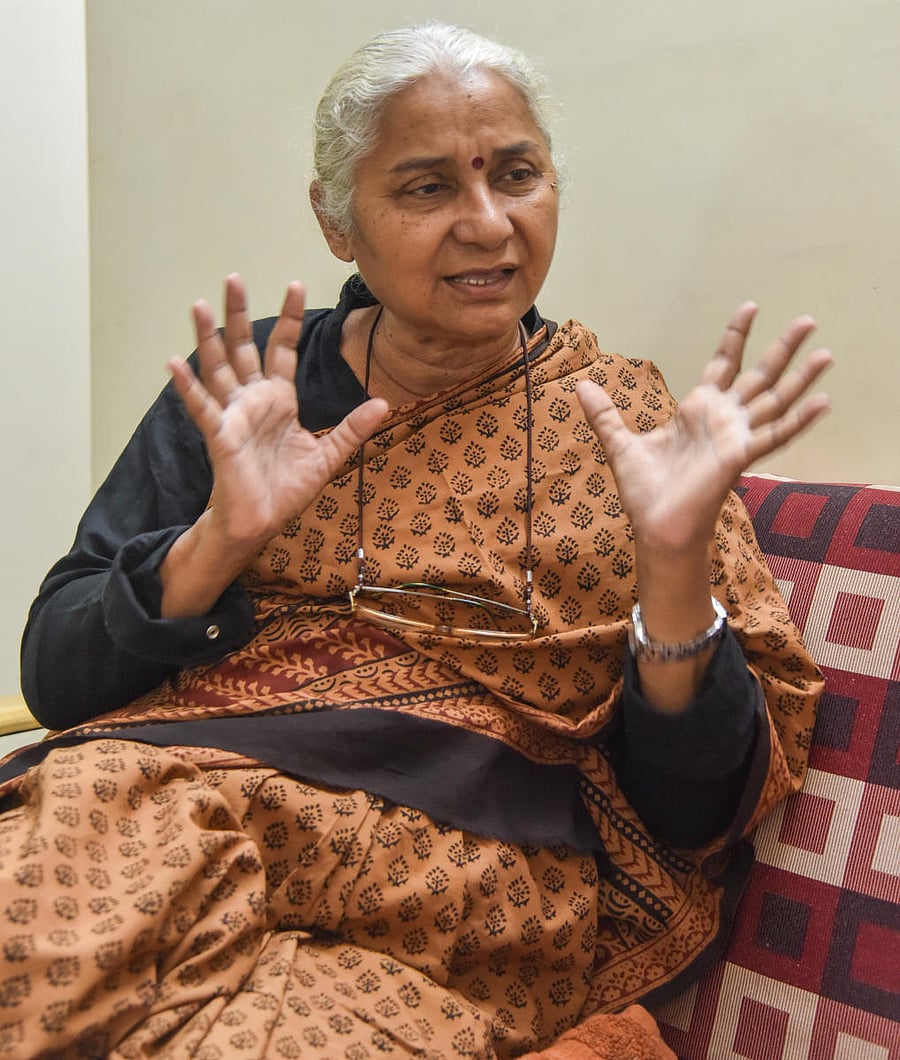
From the growing need for dialogue to suppressing dissent, the founder member of the 34-year-old Narmada Bachao Andolan and Right Livelihood laureate Medha Patkar spoke to Anitha Pailoor of DH on electoral politics, government, sustainable development goals. She also stressed on the need for people’s movements to converge to get the best results.
Governments are known to suppress people’s movements...
Yes. People’s movements are seen only as resistance. Even the non-violent movements are not given the space that is granted by the constitution. That’s why concepts like Urban Naxals have come into force. They distort everything said or done by the activists; the rulers at the Centre have taken the centre-stage. They are the ones who are continuously using violence, they condemn the non-violence movement as violent. That is a sad story. Having a different ideology doesn’t mean people are violent.
Is there any place left for people’s politics when the power game is so glaring in the electoral politics?
Electoral politics was based on the Representation of the People Act, 1951. But now they are not representing the people. The whole letter and spirit of the Act have been violated. There is a place for the panchayats in the Act. These units of governance and decision-making are totally bypassed. Instead, [politicians] come from the top, with their capital investment, into the game of managing vote banks.
Anti-defection law is falling short of the requirement. The party funding has no limits, now the new [electoral] bonds show that they don’t want to be accountable on the funding issue. They have not accepted RTI as applicable to political parties.
Is the government right in making retrospective amendments to the Foreign Contribution Regulation Act (FCRA)?
Actually, they have no right to question the foreign funding to NGOs. We [Narmada Bachao Andolan], who have not been dependent on foreign funding, are also questioned by them. This is systematically done to target the activists, to defame them.
And they are themselves heavily foreign-funded. The Modi government is the worst of all. They have all the funding from all the international institutions.
But they are trying every way to finish off resistance and question. There is intolerance, not only on the grounds of religion and caste but also on the ground of development and governance.
Is the government overlooking certain pressing issues?
There is no dialogue, but I can’t say there is no response. Congress brought out many legislations during their regime but they couldn’t capitalise on that. Those Acts were drafted with direct participation. In the Planning Commission, there were working groups, and people who were against many of the Congress policies also were permitted to sit, discuss and suggest. There was no 100% consensus, but there was dialogue. The National Alliance of People’s Movements participated in the process of formulating most of these Acts. Today, that kind of dialogue is not taking place.
Recently, the Ministry of Environment, Forest and Climate Change was trying to change the Forest Rights Act. The draft was ready. It was also sent to the departments for consent. On November 21, there was a huge protest, the same day, Minister Prakash Javadekar had to hold a press conference and announce its withdrawal. We are not dissenting for the sake of it. We want a pro-people approach in the development paradigm, in democratic governance.
Are people being benefitted from Make in India?
Make in India and India Shining are just slogans. Make in India is happening through machines, not through hands and not through sustainable use of natural resources.
The non-formal sector is actually the mainstream. Some 93% of workers who are considered unorganised are more organised. They should be called as insecure, unprotected. They are the ones who are really bringing in products that fulfil the basic needs.
This kind of conflict exists because there is no level-playing field. So their livelihoods are finished. So one sector after the other is affected. Not just handloom, but also middle-scale industries, village industries, home industries have no market now. They are considered ancillary. Industrial colonisation is happening now. Nothing is left out for the people who live self-reliant lives, producing things to fulfil the basic needs without much destruction of the environment.
Where do we stand in achieving sustainable development goals?
International conferences or agendas, be it sustainable development goals or climate change, they remain at the international level. They don’t translate into action. A kind of fakery is in the air and there is a lot of criticism about it. It is not only in electoral promises or manifestos, but it is also in these kinds of concepts of paradigms.
Sustainability will come in the development paradigm only if those who have sustainable lifestyles get into the decision-making groups. So the community has to be the unit. That is what the Constitution says.
Planning of development must start from the community. And those should be incorporated into broader plans. This is called the principle of subsidiarity. Unfortunately, that is not happening. There are no inputs towards sustainability or towards justice in the planning process.
Tell us about the journey of Narmada Bachao Andolan...
Narmada Bachao Andolan has completed 34 years. It is clear that we compelled the World Bank to withdraw from the Narmada Valley. The international commission appointed under the chairmanship of UNDP vice-president felt that this project could be completed only through unacceptable means. That has resulted in a panel formed within the World Bank.
We got five acres of land each, for about 20,000 families. Officials and leaders say that if there was no struggle, this wouldn’t have happened. But thousands remain to be rehabilitated. We are not only continuing the struggle but are also active in reconstructive work through Jeevanshalas.